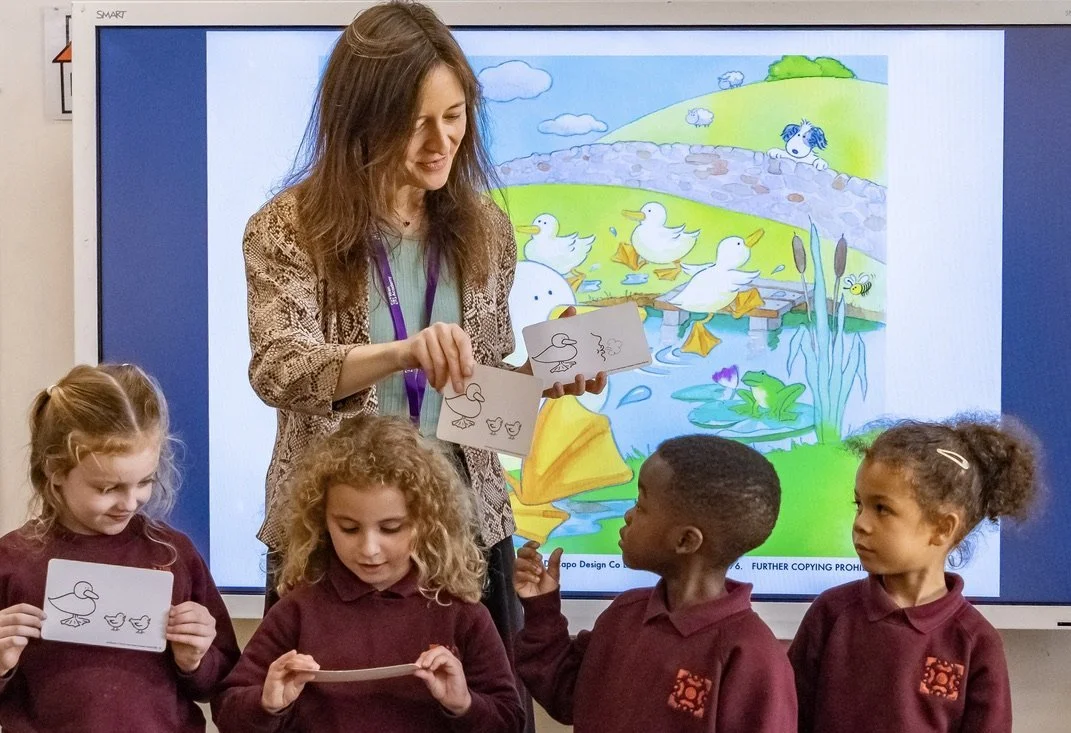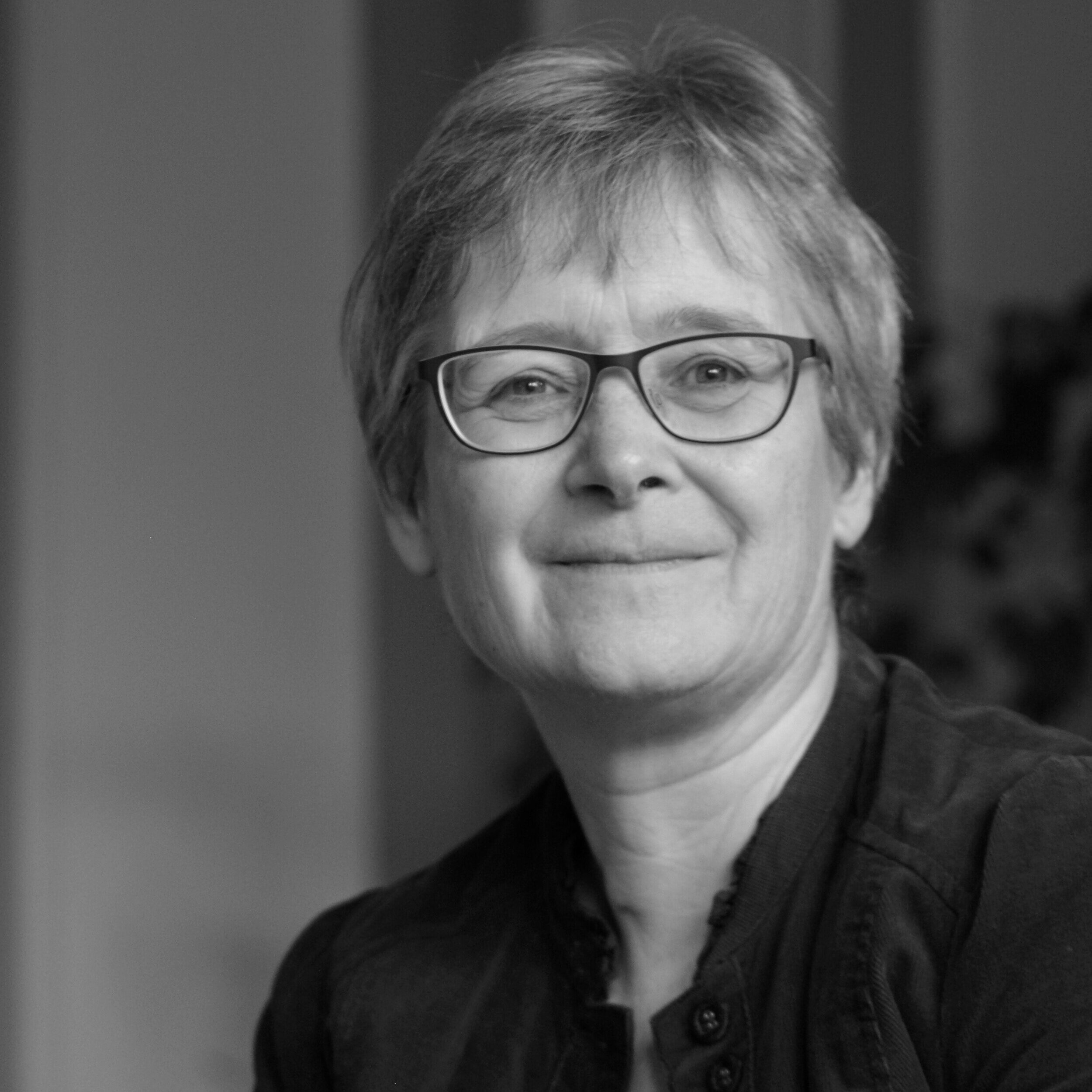Learning Resources Story
Introduction
DaCapo have been developing, producing and commissioning since 1992. It’s been an important part of our work. We saw the need for repertoire that was Kodály-based and suitable for young voices and instrumental teaching materials that use song as their starting point, are easy to learn, and have occasional dashes of humour added. To achieve these aims we have worked with some wonderful people, who have made the DaCapo collection the exciting mix that it is today.
Early Years
We started to produce materials for use in our early years music classes to assist with the understanding and learning of musical concepts; large Classroom Pictures to help children to remember the words of a song and act as a springboard to creative ideas; Musical Animals, to inspire children to hear the sounds of animals inside their head and reproduce them; Young Rhythm Cards (our best seller) using animals as a starting point for reading rhythms before moving onto traditional rhythmic notation; and the DaCapo signature Heartbeats - small heart shapes to enable children to physically illustrate the pulse.
Working with children who have had little or no access to music making we realised that they need to be engaged by subject matter that is more compelling than most of the folk music traditionally used by Kodály specialists.
And so we commissioned new materials!
SongBooks and Instrumental tutors
Having had great success with the early years music classes and materials it was obvious that we should use the DaCapo songs that the children had grown up with for instrumental teaching and this is how the Singing Instrumentalist books were born.
They were quickly followed by the Complete Instrumentalist, a collection of supplementary songs that can be used in the classroom and for instrumental lessons to supplement the Songbook 1 songs and the Singing Instrumentalist books. Songbook 2 followed.
Choral Collections
We worked with Aurora Orchestra for a number of years and, in preparing for projects and performances, we wanted to create an opportunity for junior aged school children, who had had very little musical experience, to perform with these young professional musicians. This led to our first commission and collaboration with Christopher Willis - ‘Boom Town’. The hours spent developing materials with Chris was very exciting - who knew what character would appear next? We needed materials which suited the DaCapo style of teaching but was also stimulating for the professional musicians. This project with multiple schools, culminated with lively concerts in iconic venues such as St John’s, Smith Square.
Having had success with ‘Boom Town’ we ran a summer school to give other children the same opportunity and to make the most of the materials we had developed. We had something for the older children but needed a performance piece for younger ones and so Pete Furniss worked his magic, arranging the songs from Songbook 2 for this course. And so the DaCapo Summer Schools were launched! We wanted to run a course which all ages of children could take part in together and approached John Ashton Thomas who agreed to write for us. The result, over the next ten years, was several collections of songs for children’s chorus based on themes: The Sea; Around the World; Pictures; Planets, Moons and Stars; Street Party; Assalay and Chocolate.
These materials cater for children aged 5-11 with songs and instrumental parts for older children and teenagers, accompanied by a small number of professional players. They are so flexible that they can be used by choirs generally to provide successful performances. We continue to arrange the repertoire to make it more accessible.
Not every school choir has access to a group of professional musicians and so we are busy having these scores arranged for chorus with piano accompaniments.
And so we move on and we are now working with some of our teacher/composers and meeting other young composers who will contribute to the growing collection, keeping it fresh and adding to the selection that we are making available for choirs and musicians.
All materials are tried and tested - by our team of 30-plus teachers who work at the Saturday Music Centre, in schools or out in the community. This allows us to make sure that every song or piece is suitable, well received and proves itself to be a valuable and fun teaching tool.
Many of the DaCapo materials are available in the shop and the choral collection is slowly being prepared for publishing.
The importance of words in teaching and learning music
During our first Summer School we realised that all of the music that had been prepared needed words to help with the delivery, aid the memory and to some extent, to teach the rhythms.
We asked Tracey Mathias if she could help and, in the very little time that she had, she managed to provide words to every single bit of the music! The one line which still stays with us is "and a camel will come in handy".
With someone in our midst whose skills and humour were this good we couldn't let it pass and so Tracey began to write words for songs and re-word traditional tunes.
Children (and teachers) need interesting and unpredictable stories to be told by each short song and the characters need to be just that! Granny, who appears in many of the songs, is known for her multiple adventures, from causing a Great Chocolate Flood, to building a Space Ship! We also have the beautiful, evocative words for Sirens and thought-provoking but not preaching words for Two Children One Piece of Chocolate
Tracey has a good musical understanding which is important because most of the music for the songs is written first and the words added later. This ensures that the musical purpose comes first and is not accidental or incidental. There are many places where there is only one set of words for a song, but with repetition; traditionally there would be multiple verses but we encourage teachers to spend less time learning words and more time exploring the musical content, learning the relative solfa, the Kodály rhythm names and building a deeper understanding of the musical structures : secure pulse, intervals, tonality and using musical tools such as bouncing a tennis ball as you sing, changing the articulation, singing in canon and transforming the music above spending time learning more words.
DaCapo Online
In early 2000 we were asked to run a project in Northern Ireland, training classroom teachers to teach music. Initially, the team were daunted, having only trained professional musicians to teach - it gave food for thought.
We soon realised how effective it was for trained classroom teachers to deliver music, not least because they could do it on a daily basis and get away from the traditional 'once a week’ sessions that visiting musicians had been delivering. The project was a massive learning curve and prompted the production on another important resource: we made a version of our training ‘ToolBox’ for classroom teachers!
It has been our long term objective to transform this ToolBox into an online resource. Now, finally in 2024, we are able to offer DaCapo Online, bringing the DaCapo classroom music programme through the interactive boards that are in every classroom.
DaCapo Online enables classroom teachers to deliver a fully comprehensive, quality music lesson to their class, to learn with their pupils, and to have fun with music.
John Ashton Thomas
John Ashton Thomas (1961-2021) was DaCapo’s composer -in -residence for many years and wrote over 60 pieces for us.
Over his career he composed several hundred pieces either for performance or commercial use, and contributed as a composer or orchestrator to the scores of over 140 feature films, including the Oscar winning Black Panther.
From 1994 John was a teacher of composition at Trinity Laban Conservatoire. He also taught at the Royal Academy's Jazz department for 12 years. As a conductor he worked with Diana Ross, Michael Bublé and Oscar-winning composer Stephen Warbeck, amongst others.
John wrote music that has been heard on dozens of TV productions including Country File, Top Gear, Coast and Oprah. His concert music has been performed at venues such as the Royal Albert Hall (Proms 2018), the South Bank Centre, the Barbican, and at Glastonbury Festival. As a pianist, John performed at Ronnie Scott’s and the 606 club in London, as well as Harvelle’s in Los Angeles.
Tracey Mathias
Tracey is DaCapo’s writer-in-residence and has contributed enormously to the quality and success of our repertoire collection.
She grew up in Cardiff, Wales, studied history and anthropology, and worked as a teacher and in international development. She has three grown-up daughters (who were all DaCapo pupils), and lives with her husband and a cat in north London.
Her Young Adult novel SILENCE IS ALSO A LIE was published in 2018 by Scholastic UK. It was a 2019 White Ravens selection and winner of the 2019 Bristol Teen Book Award.
Other contributors
Fred Plowright
Peter Furniss
Christopher Willis
Carl Herring
Rachel Groves
Sharon Landau











